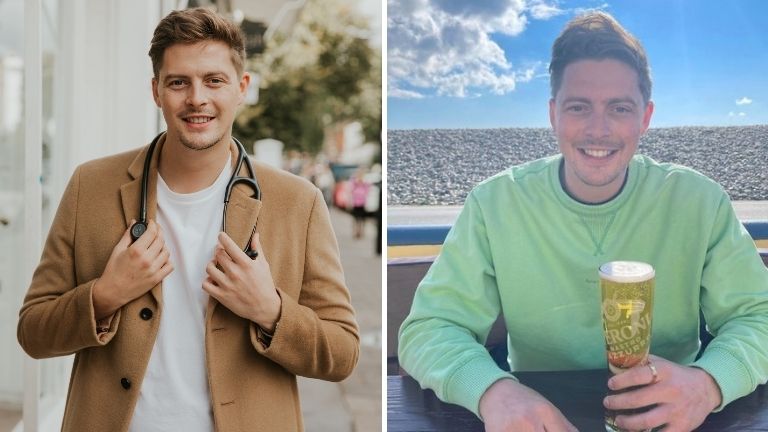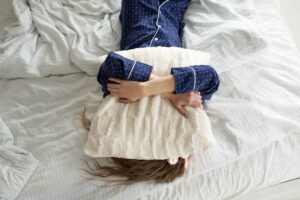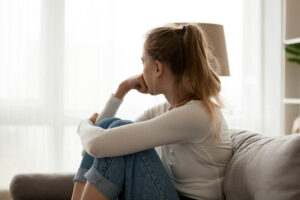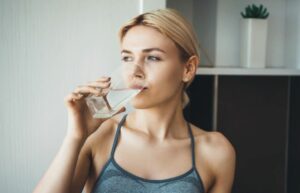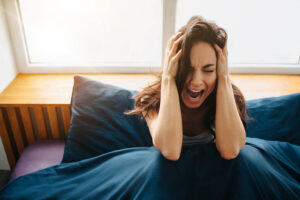Do you feel anxious after a heavy night out? Healthista editor Olivia Hartland-Robbins spoke to Love Island star and A&E doctor Alex George on how to deal with and prevent hangover anxiety
Since the end of lockdown, aka ‘Freedom Day’, Brits have been enjoying their new found freedom by going out and socialising – which is totally understandable after all that time indoors.
But it turns out, it isn’t all fun and games.
A study by non-alcoholic spirit Caleño has revealed that more than one in three Brits who drink – that’s 36 per cent of us – have experienced ‘hangxiety’.
‘Hangxiety’, is the anxiety associated with hangovers after having a few too many alcoholic drinks.
more than one in three Brits who drink – that’s 36 per cent of us – have experienced ‘hangxiety’
Oh and it’s especially prevalent in people aged 18 to 39, of which two in three (65%) have experienced it. Plus, a third of people in the same age bracket say that their hangovers have increased in frequency since the easing of lockdown.
Love Island star Dr Alex George, who is also an A&E doctor and the UK’s first government advisor for mental health says, ‘With things opening again, we’ve gone into a bit of a socialising overdrive. This has meant increased drinking, which is most likely the reason for this increase in ‘hangxiety’.
Healthitsa spoke to Dr Alex George for his advice on dealing with hangxiety and how we can help to prevent it…
What is hangxiety?
Hangover anxiety – or ‘hangxiety’ – is the mental health effect of a hangover.
‘Hangexity is a phrase that has been coined recently that relates to the way people feel (usually the next day) after they have had a few too many alcoholic drinks,’ says Dr Alex.
‘In the short term, consuming alcohol leads to feelings of increased confidence, can make you more alert and chatty and can cause you to feel more relaxed.
‘But what we find the morning and even days after is a negative affect on your overall mood and general well-being. Yes, you get the feel-good benefits in the first few hours after drinking alcohol, but after comes the low mood, anxiety, tiredness and fatigue’.
the mental health effect of a hangover
This happens because alcohol is a depressant, causing our serotonin (mood hormone) levels and other chemicals in our brain to change, which can lead to increased feelings of anxiety.
‘What goes up, must come down. Because we felt that buzz the night before from altered brain chemicals, the next day we will experience an opposing effect which is why people notice such a negative impact on their mental health after drinking,’ explains Dr Alex.
‘If you look at current drinking trends, I believe that in the next few years people will option to drink more non-alcoholic beverages.
‘Not necessarily to stop drinking alcohol completely, but as a choice for when you only want a couple of drinks in order to avoid the dreaded hangover and the anxiety that comes with it’.
Hangxiety symptoms
In addition to the physical symptoms of a hangover, such as headache, dehydration, tiredness and feeling sick, people can experience the following mental health symptoms:
- Feeling anxious
- Palpitations
- Faster heartbeat
- Feeling teary
- Sweaty palms
- Low mood
- Trembling
- Dizziness
- Panic attacks
- Worrying about the past and future
If alcohol consumption is too high over a longer period of time, it can impact someones mental health and general well-being.
‘Alcohol is seen as a depressant, which means over time, if your serotonin and brain chemicals are consistently altered, it could lead to depression,’ warns Dr Alex.
Who is more at risk?
Everyone is very different, some people don’t experience hangxiety, but factors such as genetic make up and how alcohol affects you as an individual plays a part.
‘As does your state of wellbeing,’ says Dr Alex.
‘For example if you have poor mental health and suffer from anxiety or depression, these symptoms can be made worse.
‘Plus, if you tend to worry more, you may also be more likely to suffer feelings of hangxiety than others.
Dealing with ‘hangxiety’
Dr Alex George says that seeking reassurance can be helpful when dealing with hangxiety.
‘Talking to a friend about the night before and why you might be anxious will help to put your mind at ease.
‘When people begin to understand why they feel a certain way it can be a huge reassurance and stops them thinking ‘Why is this happening to me? Why do I feel like this?’
Contextualising those anxious and worrying thoughts will help you to understand why you are feeling that way.
don’t knock back loads of sugary drinks either, as that can cause an adrenaline type response
‘One of the things I wouldn’t suggest doing is waking up and having loads of coffee as this can cause further anxiety. If you must have coffee, opt for decaffeinated coffee, that’s what I tend to do,’ suggests Dr Alex.
‘Also don’t knock back loads of sugary drinks either, as that can cause an adrenaline type response which can lead to further jitters and feelings of anxiety’.
Re-hydrate
‘When you come home and you’ve had a few too many drinks, be sure to re-hydrate with plenty of water before you go to bed,’ advises Dr Alex.
‘It’s vital you do this because when you go to bed, regardless as to whether you have been drinking alcohol or not, sleep is a dehydrating process. So alcohol will only enhance this.
‘You don’t drink water through the night, but water is still evaporating through your skin. That’s why when you urinate in the morning it tends to be far more yellow in colour.
re-hydrate with plenty of water before you go to bed
‘Continue to re-hydrate the next morning and be sure to have some carbohydrates and sugar. People often feel jittery the next day due to a decrease in their sugar levels, so it’s important to regulate your sugar levels to stop this’.
Rest
Have lots of rest and remind yourself that this is what alcohol does. So be aware that the way you are feeling is mostly related to the alcohol.
Have a day of calm, and try not to do anything that will add to your feelings of anxiety.
Recharge
We know that nature is great for well-being and reducing feelings of anxiety.
‘If you are feeling particularly anxious, getting outside in the fresh air and having a walk and a chat to someone also feeling that way can really help,’ suggests Dr Alex.
‘Feeling cooped up isn’t very good for us, so if you are feeling well enough, get outside for some fresh air and call a friend if you can’.
For those who feeling especially anxious…
‘If you wake up and are suffering from severe anxiety the first thing to do is sit up and start counting or naming everything around you in the room,’ says Dr Alex.
‘This helps to bring yourself back to the present moment. Say what you see out loud, even better get up and touch each object, while saying the name of it out loud.
start counting or naming everything around you in the room
Breathing is another great technique in diverting your worrying thoughts back to the present moment. Remember anxiety and worry is based on fear of the future and uncertainty.
‘If we are focused on our breathing it means we are less focused on whatever it is that is worrying us or causing feelings of anxiety,’ adds Dr Alex.
‘Slow down, close your eyes and focus on breathing in and out. Remember to count your breaths. Often you find that by the time you get to 50, 60, 70 breaths you have bought your heart rate down and are starting to feel much calmer’.
Preventing ‘hangxiety’
Dealing with anxiety is one thing, but wouldn’t it be great if we could prevent it all together?
‘If you know that alcohol is making your anxiety worse and your mental health is suffering then you need to look at cutting back and finding alternatives,’ suggests Dr Alex.
‘This isn’t about not drinking altogether, it’s about balancing your drinking. So for every alcoholic drink, enjoy a non-alcoholic one after.
‘Oh and you don’t have to settle for tap water anymore, there are some delicious options out there now, my favourite at the moment is Caleño.
‘I love having the option of drinking a non-alcoholic drink that’s actually refreshing and re-hydrating, because then your friends can’t make fun of you for going up to the bar to get a pint of water.
I love having the option of drinking a non-alcoholic drink
‘Have the confidence to say no to a drink, and don’t let anyone pressure you into ‘just another one’. Listen to your body and know when you’ve had enough. You’ll be pleased the next morning when you wake up without a hangover’.
Other factors other than alcohol also can be blamed for increased anxiety. ‘Be sure to look at your general lifestyle too,’ says Dr Alex.
‘Are you getting enough exercise? Are you sleeping well? Are you incorporating self-care into your everyday routine? Are you confiding in your family and friends about anything that is worrying you?
‘Life is about balance, if you are experiencing anxiety after drinking or are feeling anxious in general, then try and make modifications to your lifestyle in order to mitigate those feelings’.
More Healthista Content:
Incorporate turmeric into your diet with these 3 healthy recipes
10 menopause symptoms myths debunked
5 easy & healthy dinner ideas for people who hate cooking
A gynaecologist’s guide to heavy and irregular bleeding
5 foods proven to reduce stress and anxiety
Like this article? Sign up to our newsletter to get more articles like this delivered straight to your inbox.



